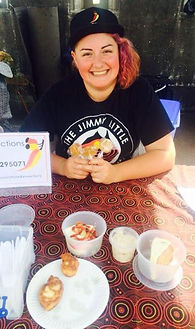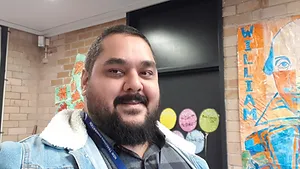Jess Sinnott – Cultural Educator/Owner

Yuin and Wailwan woman, Jess Sinnott is the Founder/Managing Director of Koori Kinnections – a 100% Aboriginal owned and operated Cultural Education business, offering education programs and tours for all ages. Growing up and living on Wangal and Dharug lands (Sydney), Jess gained a wealth of knowledge about Aboriginal culture, history, and heritage from her family, community and co-workers.
Jess’s background includes work as an Aboriginal Education Officer/Cultural Educator for a number of renowned organistions, including:
The Aboriginal Heritage Office – North Sydney
TAFE NSW Sydney, and Northern Sydney Institute (Teacher – Cultural Tourism and Tour Guiding)
The Royal Botanic Gardens – Sydney
National Parks and Wildlife Service – Royal National Park
Sydney Learning Adventures – The Rocks, Sydney
Taronga Zoo – Bradley’s Head
As an Aboriginal Education Officer her main goals are to change the perceptions of Australian Aboriginal history and culture, and to make learning about our first peoples fun and entertaining!
Judith Jarrett – Cultural Educator

A proud Gumbayngiir woman.
a qualified childcare worker with over 20 years of experience working in preschools and primary schools.
“I find art is the activity that crosses many boundaries ages and cultures.”
Jude holds a cert 2,3 & 4 in Aboriginal and Torres Strait Islander cultural arts.
Has run art workshops for children and adults in schools,afterschool care and has done two large murals in office buildings in the CBD and has a painting in the City of Sydney people’s art collection.
Her artwork has been used to illustrate a children’s book, flyers, and used with official presentations.
Trent Kelly – Koorikinnections Manager/ Cultural Educator

Trent Kelly is a proud Yuin and Wailwan man.
Trent was born and raised in the LaPerouse Aboriginal community in South Eastern Sydney on Dharawal country. He draws his cultural knowledge from his family, community and co-workers and strives to extend and deepen this knowledge as he believes that cultural education is a lifelong endeavor.
Trent has worked in education for many years including both high school and primary school. He has worked at schools with high populations of indigenous students and otherwise.
Trent took part in The Aboriginal Cultural Residents Program which is an initiative by The University of New South Wales that is attempting to install Aboriginal cultural educators into primary schools as part of the standard curriculum.
“I believe that ignorance breeds prejudice, so as an educator i believe that it is my duty to share my cultural knowledge and insight with a broad audience in order to widen our understandings of one another and close the gap between indigenous and non-indigenous peoples.”
